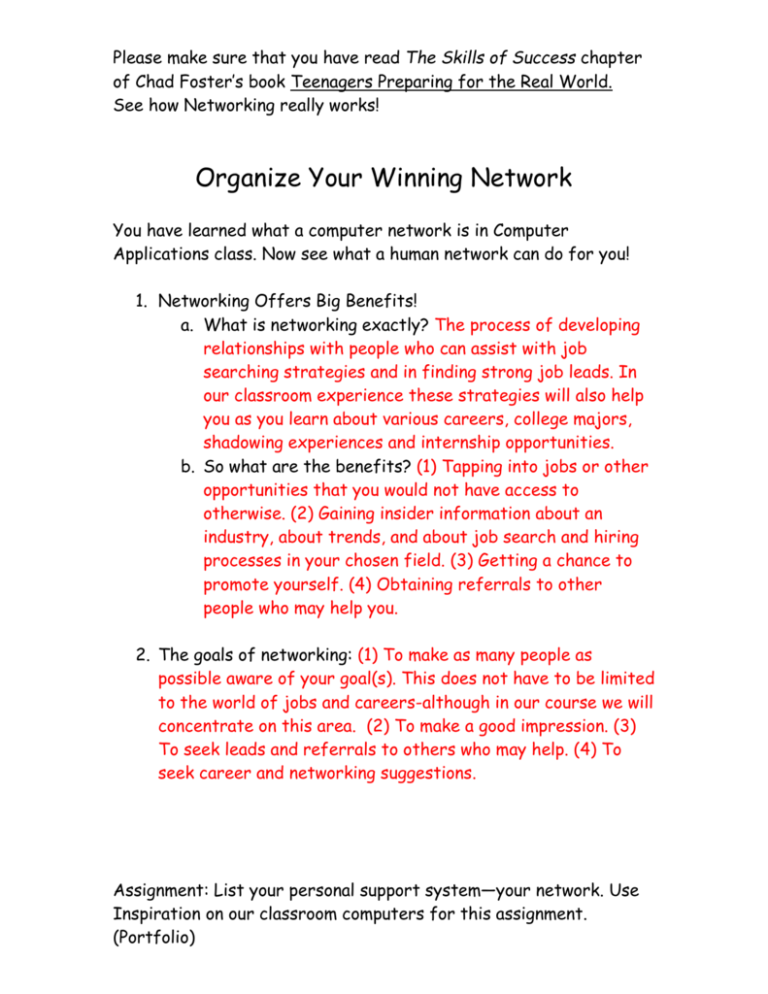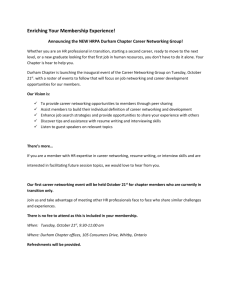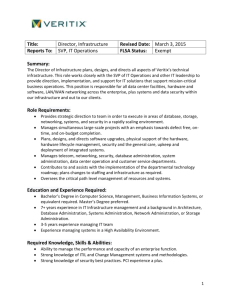Organize Your Winning Network
advertisement

Please make sure that you have read The Skills of Success chapter of Chad Foster’s book Teenagers Preparing for the Real World. See how Networking really works! Organize Your Winning Network You have learned what a computer network is in Computer Applications class. Now see what a human network can do for you! 1. Networking Offers Big Benefits! a. What is networking exactly? The process of developing relationships with people who can assist with job searching strategies and in finding strong job leads. In our classroom experience these strategies will also help you as you learn about various careers, college majors, shadowing experiences and internship opportunities. b. So what are the benefits? (1) Tapping into jobs or other opportunities that you would not have access to otherwise. (2) Gaining insider information about an industry, about trends, and about job search and hiring processes in your chosen field. (3) Getting a chance to promote yourself. (4) Obtaining referrals to other people who may help you. 2. The goals of networking: (1) To make as many people as possible aware of your goal(s). This does not have to be limited to the world of jobs and careers-although in our course we will concentrate on this area. (2) To make a good impression. (3) To seek leads and referrals to others who may help. (4) To seek career and networking suggestions. Assignment: List your personal support system—your network. Use Inspiration on our classroom computers for this assignment. (Portfolio) Please make sure that you have read The Skills of Success chapter of Chad Foster’s book Teenagers Preparing for the Real World. See how Networking really works! Networking is the top source of job leads because employers prefer to hire people referred to them personally (through networking). Therefore, the larger your network, the greater your odds are of finding someone who knows a viable prospective shadow mentor, intern mentor or employer! Networking sources: Friends Relatives Current and former employers Coworkers Teachers, trainers, coaches, counselors Career/job/college fairs Classmates and alums from HH People you serve or meet at work or volunteer activities (customers, etc.) People from your place of worship Neighbors Members, newsletter, membership directories and websites of you clubs and volunteer groups Websites, bulletin boards, news/chat groups People with whom you do business (salespeople, clerks, others) You could easily have 100-500 acquaintances. Multiply that number by two (two-referrals from each person), and the potential is astounding! Assignment: List your personal support system—your network. Use Inspiration on our classroom computers for this assignment. (Portfolio) Please make sure that you have read The Skills of Success chapter of Chad Foster’s book Teenagers Preparing for the Real World. See how Networking really works! The following guidelines will help you get the most from your networking efforts: Ask everyone for advice. Getting leads is important—they are your goal. Don’t say “I’m looking for a ______ (you fill it in; job, shadow mentor, etc.), do you know any?” Better is to say “I’m looking for a _______ . Do you have any advice for finding one in ________ (industry)? This focuses on the word advice and makes your contacts more inclined to help. Be courteous. Also ask for names of referrals you could contact to seek additional info. Put college & career fairs high on your list. Fairs are an excellent networking source because you can connect with many potential college reps as well as career info sources. Participate actively in relevant groups. Join and be active in clubs and other relevant associations or groups. They are a valuable resource for getting leads and keeping informed. E-Network. Search for and communicate with contacts via the Internet. Network for life! (Chad Foster’s example) In today’s changing work world, it is essential to build and maintain strong networking relationships throughout a career, not just during a college or job search. Networking regularly will help you remain informed and connected in your field and ready to make a successful job change or be “there” (your name will come to mind) when opportunity arises. Remember: It’s a numbers game. The more people who know about you, your goals and qualifications, the greater your chance of finding the ideal career and (eventually) job! Assignment: List your personal support system—your network. Use Inspiration on our classroom computers for this assignment. (Portfolio)


